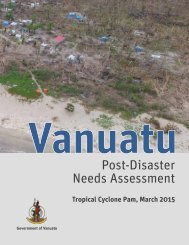Fiji
yqgk302EGjo
yqgk302EGjo
You also want an ePaper? Increase the reach of your titles
YUMPU automatically turns print PDFs into web optimized ePapers that Google loves.
FIJI Post-Disaster Needs Assessment<br />
Table 62: Estimated Losses in the Electricity Sector (F$)<br />
Cost Estimate<br />
FEA loss of revenue from disconnected customers 3,530,479<br />
Medium-term loss of revenue from an estimated 1,500 customers whose houses have been destroyed 40,000<br />
Higher operational costs from temporary reliance on diesel backup 4,500,000<br />
DoE loss of revenue from solar home systems 50,000<br />
Total 8,120,479<br />
Source: <strong>Fiji</strong> Electricity Authority; Department of Energy.<br />
Social Impact of Damage and Losses<br />
In light of the increasing use of firewood, especially in rural areas (where firewood is used by 77 percent of the population), 106<br />
the abundance of firewood left by the cyclone (from downed trees) probably represents a gain for households. For women,<br />
who typically are responsible for gathering firewood, the cyclone reduced the time needed for that chore. (Women who were<br />
interviewed confirmed this benefit.) However, the impact of the cyclone on electricity supply has substantially increased the<br />
amount of time women spend doing laundry, both in rural and urban settings. In some areas, women will continue to face<br />
these challenges until mid-year, when FEA anticipates full reconnection at the household level. Baseline data on washing<br />
machine use at the household level suggest a washing machine penetration rate of 70 percent. 107 Because washing must<br />
now be done manually, time allocated for laundry has increased from about 30 minutes a week to around three hours<br />
a week. Lack of electricity combined with disruptions in water supply has increased the domestic work burden and left<br />
women with very limited time for income-generating activities.<br />
In addition to affecting women’s household burden, lack of electricity also affects women’s opportunities for social and<br />
economic advancement. Electricity provides the mechanical power that women use for agricultural food processing,<br />
cooking, lighting, refrigeration, communications and commercial enterprises, while minimising the time expended on<br />
domestic work. Electricity supply disruptions have, therefore, undermined women’s ability to derive livelihoods that depend<br />
on electricity (for example, rural economic activities, such as virgin coconut oil production).<br />
Less visible perhaps is the impact of electricity on women’s and girls’ safety and sense of security. Following TC Winston,<br />
women and girls reported feeling insecure about going to sleep at night. 108 Lighting is a good deterrent to violence and its<br />
absence could put women at heightened risk.<br />
Speedy restoration of electricity is essential for the return of power-dependent livelihoods and safety. In terms of helping<br />
communities prepare for future cyclones, training men and women in securing their solar panels and equipment ahead of<br />
impending cyclones would be beneficial.<br />
Recovery and Reconstruction Needs for the Electricity Sector (F$34 million)<br />
Total recovery and reconstruction costs for the electricity sector have been estimated at F$33.8 million (Table 63). Recovery<br />
needs include:<br />
<br />
<br />
<br />
<br />
<br />
<br />
Table 63: Total Recovery and Reconstruction Needs for the Electricity Sector (F$ million)<br />
Recovery Reconstruction Resilience Total<br />
Generation 1.8 1.8<br />
Transmission 6.7 6.7<br />
Distribution and Retail 17.4 17.4<br />
Communications 2.0 2.0<br />
106<br />
<strong>Fiji</strong> Bureau of Statistics, Household Income and Employment Survey, 2008/2009.<br />
107<br />
Between 2002 and 2008, household-level washing machine usage increased from 15 percent to 31 percent. Assuming the same rate of<br />
increase, household-level washing machine usage is now at 70 percent.<br />
108<br />
“<strong>Fiji</strong> Gender Based Violence Sub-Cluster Key Advocacy Note,” April 9, 2016.<br />
90 Tropical Cyclone Winston, February 20, 2016



